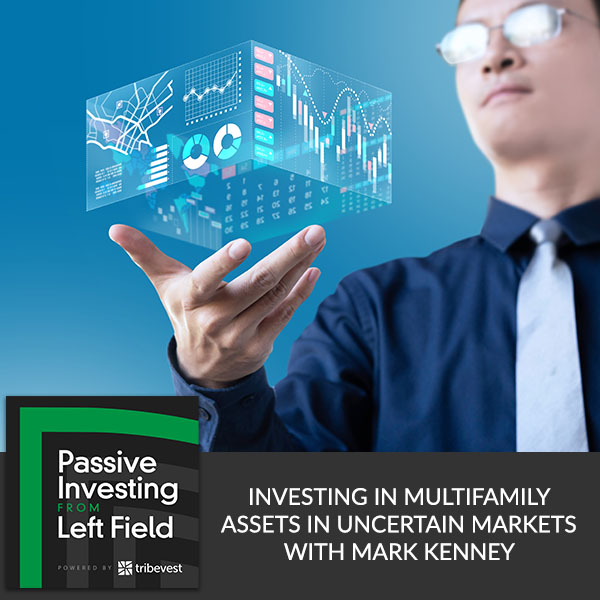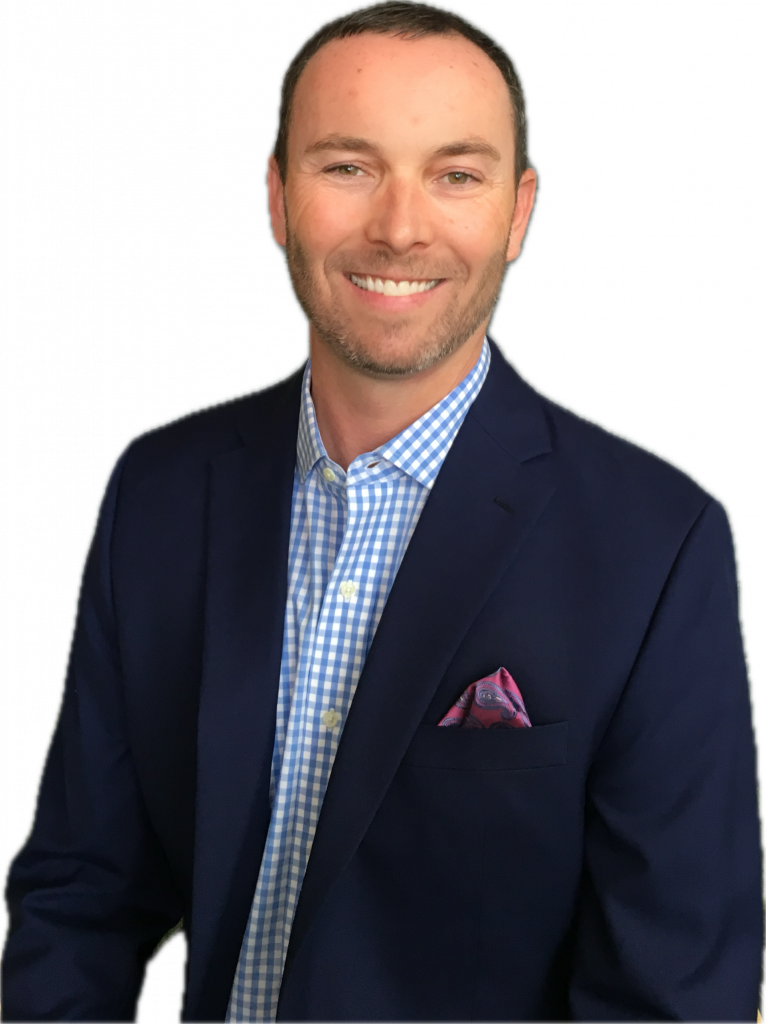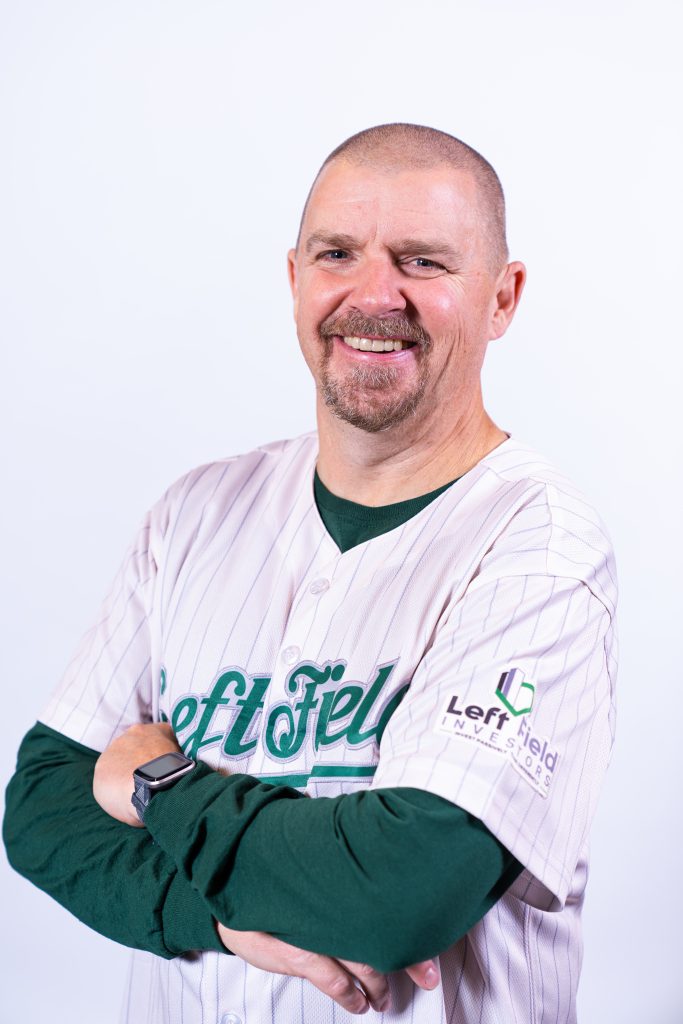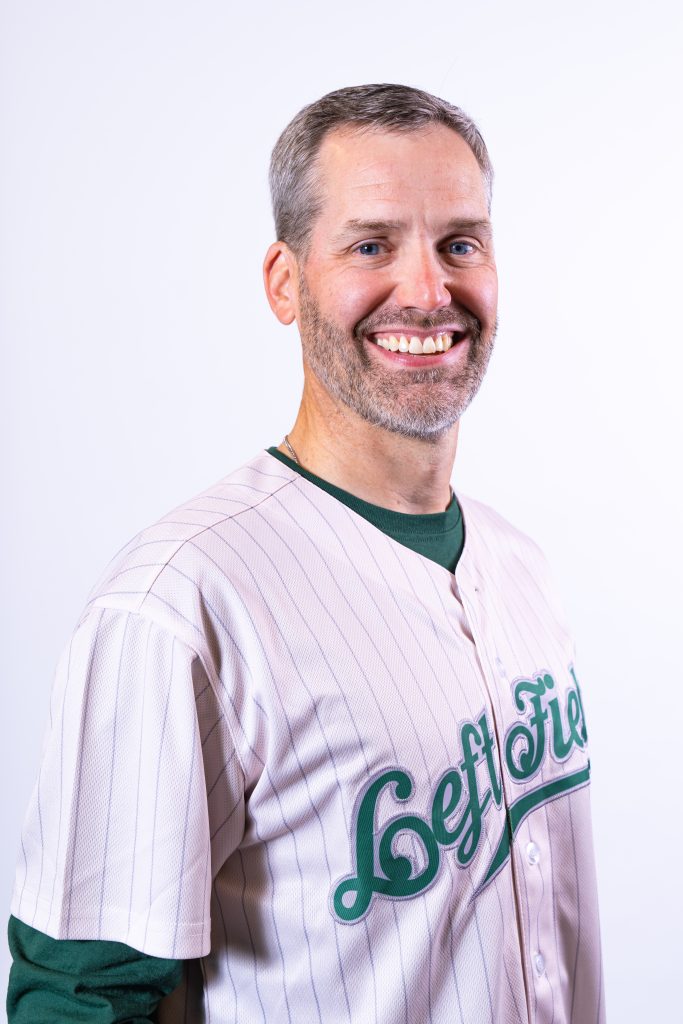
There can be advantages to investing in uncertain market conditions, rather than completely turning yourself off to new opportunities. Mark Kenney, the Co-founder of Think Multifamily, subscribes to the theory that there are quality deals to find in any market cycle. In this episode, he joins Jim Pfeifer to share with us his incredible journey and the unique process he follows in investing and sourcing multifamily properties – often dealing with multiple offerings at the same time. Mark discusses bridge debt and explains why he is still using it effectively in certain situations. He has a positive track record in multifamily and he has experienced a lot of success, but he is willing to admit that there is more out there to learn. He is carefully bold in uncertain times, which can set him up to capitalize on market inefficiencies. Follow along to this conversation to learn more!
—
Listen to the podcast here
Investing In Multifamily Assets In Uncertain Markets With Mark Kenney
I’m excited to have Mark Kenney with us. He is the Founder and CEO of Think Multifamily, an operator that acquires, owns and operates multifamily apartments. Mark, welcome to the show.
Thanks for having me. I’m excited to be on.
The first question I always ask is if you could take some minutes and talk about your financial journey. How did you get into real estate? How did you become an operator and an educator for new operators?
I started investing in small multifamily in college. I was a senior in college along with my twin brother Michael. It was quite a while ago. I continue to buy small properties. I was a CPA for a while. I did IT consulting and worked for the big four as a manager consultant. I started my own IT company. I got married young. I continued to buy small properties. In 2013, my IT business was doing well financially and things like that. I was working 90-plus hours a week, not once in a while. That was my lifestyle. I slept three hours a night on average. It is not a good lifestyle.
It caused some issues for some reason in my wife. I’m not sure why but it did. She was like, “This is not working. You need something different.” We both liked real estate. I had a friend of mine that was syndicating in 2013. It is a fancy word for raising money from other people, group purchasing to buy larger deals. I had some retirement money.
I have invested in his deal with multifamily deal. I’m like, “This makes sense.” Both my wife and I were like, “Let’s try to take a shot at this.” We looked at a lot of different things before we concluded this was where we wanted to go. We started doing our deals. It took us about a year to get a deal. In syndicating our deal, we have done over 100 total deals as a general partner for over $1 billion and it was in 13 states.
It was a little bit slower than I wanted. It took like a year to get a deal. We started looking at different parts of the country because we thought maybe certain areas were a little more attractive and started expanding that way. My whole goal initially was like, “All I need to do is replace half my IT income and still be okay.” We far surpassed that, which is great financially. We had no desire to do education at all. Through some circumstances and being involved in different organizations and things like that, I thought education was lacking in other groups. I also thought the transparency of issues you run into wasn’t there.
As I went through deals, I was like, “Why didn’t people tell me this? I wish I knew what I know now.” We slowly became where we were doing webinars here and there and half-day events, full-day events and full fledge one-on-one coaching. Both my wife and I fell in love with it. It is a community. It is called the Family Syndication Group. People are working together to do deals.
It wasn’t anything I intended to do at all. I was an IT guy and CPA. My wife, fortunately to me, was the community type-person. We wanted to have a family vibe. We do a vacation together with people in our group in the summer. That is how we landed. I’m not sure how I ended up in real estate because there was nobody that I knew was doing it. My brother and I were more analytical. We were like, “People need a place to live. Let’s buy some real estate.” We started doing that. I didn’t know what we were doing. The education piece was more through circumstances and the community aspect, my wife to me, that is how I got involved in that area.
I had not a similar story but an unintentional entrance into real estate. It seems like everybody reads the purple book by Robert Kiyosaki or they get a small start and keep going. Eventually, you find out that you are running a community or you are an operator and teaching others. It is interesting how people get into this business.
I want to talk a little bit about Think Multifamily and your process because it is unique. I’m on your deal list. I have invested in multiple deals of yours but you go through stretches where quite a few deals are coming through at the same time. I like to talk about how you source deals. A lot of these probably come from some of your students and your GP on them. Can you talk about that process? How involved are you with those deals? How do you manage when you have 3 or 4 deals coming through in a month?
Sourcing deals is if somebody is starting like when we started on your own if you want to say you are meeting brokers. It is not just a phone call. You need to potentially jump on a plane, meet them face to face and build those relationships. You want to be touring deals with them because they get kudos from their sellers the more tours they have and things like that. You want to do that.
It is not every week or every month necessarily but develop that relationship. That is where most people start. A lot of people start to call brokers and it is a little bit crazy to call and say, “I want all your off-market deals.” Who do you think the brokers are going to give deals? Someone that is brand new or someone they have done twenty deals with? We need to be upfront about that. You are not going to get the off-market deals brand new, you snap.
Starting is getting that email list, meeting the brokers, a lot of deal flow and looking at a ton of deals. I don’t look at any deals. Typically, they come to me in emails anymore. It is usually brokers reaching out to me directly. They know what we like as far as our game plan, properties and the areas we like. There are some brokers we have done over twenty deals with. We run on the shortlist. I get deals that way. The brokers are contacting me for deals, which is great.
We do have one-on-one co-team people across the country. They are out looking for deals too. They can leverage if one says, “The Think Multifamily brand.” With brokers, we provide all our contacts. There are no brokers. We say, “They are special. We won’t share those with anybody.” It is a benefit to us with people out looking across the country.
In some cases, a lot of deals will have a total group-wise of about 30 deals in 2022 closing, which is a lot. It doesn’t mean we don’t ever have stress here and there. Especially you mentioned 3 or 4 deals. 3 or 4 deals might be a blessing. We have had eleven deals all at once, which is a lot of timing and how things work. A lot of capital to bring to the deals and there are a lot of things outside of your control. Lenders, how slow or fast they are. It doesn’t exist. It is how slow they are. Other things happen. You are out of your control. It doesn’t matter how good you are, how smart you think you are or how much experience you have. There are things that you can’t control.
[bctt tweet=”It doesn’t matter how good you are, how smart you think you are, or how much experience you have; there are still things you can’t control.” via=”no”]
That is the way I get deals as far as the broker relationships we had and things like that. If you are new, you probably need somebody that has been there and done that, relationship-wise. When we have a bunch of deals going out there like that, we also have to be strategic. There is usually a minimum to close a deal and there is a max. The minimum might exclude things like the general partnership acquisition fee or a contingency. We have to make decisions on certain deals. We are getting to the minimum and moving on to the next deal.
The average person doesn’t have this many deals going on at once. If you do have multiple deals going on, you are going to have to be tactical in some cases. Triage, I mean, every day almost, daily, I’m dealing with something going on a deal, either a broker situation or seller situation. You get good at negotiating. You have to be fair, not a pushover but a good buyer and a good seller. Sellers give us a lot of favors because of our reputation and our being good buyers.
How do the students that are bringing some of these deals to you? How does that work? As an investor, to be honest, sometimes I get nervous. You trained somebody. This is their first deal. I don’t know that I want to be in on somebody’s first deal. It makes it a lot better that you are on the deal because of your experience. That makes me feel more comfortable. As a passive investor, how do I vet that or get comfortable with someone brand new even though they are partnering with someone experienced?
It would probably depend on what the partner is doing on any deal that has been pushed out and seen. If I’m on it, I’m the key principle. I’m the loan. In a lot of cases, I’m the only principle. I have an incentive for the deal to perform. I’m not doing the day-to-day asset management piece of it. I get a fair bit of my time is spent on questions-related asset management. As we have grown, we somewhat concluded that no matter how good they are in business or how smart they are, there are differences to us managing their property.
We have a major focus in 2023. We went through 2 full days, 8 to 9 hours a day strategy session. One of the top priorities for us is operations, asset management and putting the overall perspective. You can’t have people all doing what they want to do. Even though you give them bumpers and guidelines, we need more visibility in certain things. It is an area that we are blowing out in a good way in 2023 to put those controls in place because we had certain people that are not stealing money or anything like that but, in some cases, the visibility that they are providing isn’t necessarily what it needs to be.
We are putting that in the forefront and saying, “We will have visibility and everything going on a deal. We will have not just guidelines but rules that you will follow.” Going forward, for newer people that come into the group and do a deal, we are going to have some certified asset managers that will be on any deal and the new person will be able to shadow them. The certified person will be the one also making the decisions on deals, which we have not had in the past.
You mentioned a key principle. Can you talk about what that means, what that is and what that means to an investor?
Some people will use these terms interchangeably but they are not. You have a limited partner, the investor in the deal. The general partner is the manager of the deal. They are the ones that will have equity. You will have a key principle or a loan guarantor. That is the person signing the loan from a requirement standpoint with a lender.
Three main things they are going to look at. One is the person’s experience. You can’t just sign on a loan because you have money. You also have to experience as a general statement. The lender is going to say, “If you have a $20 million loan, you need to have $20 million or more net worth.” That can be a combination of people and your liquidity once you close a deal needs to be typically 10% or more. In the $20 million example, 2 million or more liquid post-closing. It could be a combination of people.
You can have general partners on a deal that are not key principles on the loan. If they are not needed or necessary, maybe they are not going to be on the loan. You could have a key principle that isn’t a general partner per se. The lender will most likely make them a manager. Indirectly, they will be that way but they could give the person some compensation for signing the loan and they don’t get equity. That would be unusual but it is not a requirement to do that.
The key principle called KP is a guarantor on the loan. The loans we do historically have been non-recourse loans, $800 million or so in non-recourse loans. Non-recourse means you don’t have personal liability. The lender looks at that individual property by itself. If there was an issue, they could do something related to that property but they can’t come after you if you haven’t done anything fraudulent and things like that.
Another thing that is interesting about your group is, at least in the last few years, you have had deals go full cycle quickly, which is great. Can you talk about why that is and what you do to do that? There are multiple questions. I apologize. With the changing environment, is it still something that you want to do because the investors have to reallocate capital and there aren’t as many deals to put their money into? It was a positive a couple of years ago. Is it still positive? I don’t know.
We have a lot of deals that are projected to be 5 to 6-year holds. In a lot of cases, we have exited much faster for a couple of reasons. One, a lot of the deals we were doing were distressed deals. In some cases, 0% occupied or 20% occupied. A lot of reasons, probably different podcasts. Why don’t I like those deals as much, although they performed well? I don’t like them too.
In an example like that, we will have a bridge loan. We don’t have all the prepayment penalties after typically a year that you are going to have on a Fannie or Freddie. We can get out of a deal and sell it without having to pay hundreds of thousands or millions of dollars in prepaying penalties. If we have a bridge loan for 2 to 3 years, we can say, “Do we want to sell or refinance it? What do we want to do? Those deals that are distressed, usually after a couple of years, 18 to 24 months, you put all the capital in, leasing it up and you make a decision to say, “Do you want to refinance?” It is typically tax-free to the investors, which is great for selling.
We sold 22 deals in 2021. It is because we are geniuses and we figured out what was going to happen. It is not the case. In some cases, we got lucky. In reality, people act like they know everything will happen in the market. It is ridiculous. People say that in my mind. It was good timing. We sold at the top of the market and there will be another top of the market down the road. I don’t know when it happened but there will be. We could look back and say, “We sold that for $120,000 a door. Now it is worth $180,000.
I look at it this way. If we project, we are going to double somebody’s money in six years, which is getting harder to do. Let’s say we assume that in the proforma on a deal from several years ago. We can sell the deal and make that much. In some cases, we sold properties after several months and it was 70% to 80% return plus the equity. In my mind, there is a disproportionate amount of equity capture at 70% after a few months. That is there. Plus, the huge depreciation allocation, whether people can use it or not that year or not but allocated to investors in the first years disproportionately high. We said, “If we hold this for another 3 years, maybe we will make 10% or 30% extra per year.” That is a made-up number but there is a disproportionate amount of equity capture.
If we looked at deals in 2021 and said, “These are 45% annualized returns or higher in some cases.” Someone might say, “You said it is going to be 100% return.” I’m like, “Yes, after several years but we are giving you 70% after 18 months. I don’t think anybody should be complaining about that.” They are not typically. In the position we were in, we were doing a lot of bridge debt before a lot of the people were. It gave us an advantage.
I do think, after a certain point in time, it comes down to yes about going forward, whether we are going to keep doing that or not. I don’t know. It is probably going to be harder to do. No one knows what is going to happen with the rates but there isn’t a single deal we have done that we haven’t performed with a minimum of 5 to 6 years. It wasn’t like we projected we were going to sell this after 18 or 24 months. It wasn’t anticipated. We don’t perform that way or anything like that.
Going forward, we still do a lot of bridge debt. We do fixed debt to the agency. There are pros and cons to each of those scenarios and each deal is looked at a little bit uniquely. Our average whole has been less than three years as a whole. If a deal is a nicer deal, you put money into it or it is a nicer property versus a lot of properties we bought that after a certain number of years, you are going to have CapEx again. You were like, “Do we have the money to recapitalize this property? That is why a lot of people end up selling.
There are certain deals we have bought before that physically. It is like a chiller system, which heats and cools. One device is heating and cooling the entire complex. It is not ideal if it goes down. That is a physical characteristic and it could be hundreds of thousands of dollars to replace all the plumbing, the chiller itself and things like that.
We looked at certain deals where we have had like that too, like physical characteristic-wise. Cast iron plumbing, we do not like it. Chiller system, we don’t like it. Would we want to hold this long term? The answer typically is no. It doesn’t mean it is a bad investment. We bought a couple of deals still with chillers but that is what you look at. As a syndicator, you owe it to your investors to do some capital event, provided you can, whether it is a ReFi or a sale within the timeframe you projected. If you can’t do that for whatever reason, maybe ReFi or things like that, you should sell a property. All things being equal.

When syndicators go in and say, “I’m going to keep holding this. I have a partner on deals that don’t want to sell any property ever, as far as they can tell,” that is not the syndication model but your question about redeploying the capital is an issue in some cases. What do you do with that capital? The advantage is you put it into a brand-new deal for the year. You get, generally speaking, huge depreciation benefits allocated to you. If you hold the property after the first year, it drastically goes down how much you are getting per year for the depreciation. That is another reason. Some people do like to redeploy capital.
I don’t mind having the capital sent back because it is usually more than I gave you. You are giving me that plus the appreciation and all the cashflow. There are many fewer deals out there. Can you talk about what you are seeing from deal flow? I have talked to some other experienced operators and I don’t know that I agree with this but they say, “If someone is buying deals now, they have found the best deal ever, the unicorn or they are investing in bad deals.” I don’t know if that is true or not. How do you see it?
I would reverse it. This statement is a little bit ridiculous but I look at it. Anybody selling probably has to sell. Why would anybody list a deal now? It doesn’t make sense. If their deal is being listed, most likely, they have to sell. Their debt is coming up. Someone in the group sent me something where the partnership is splitting up. There is a deal out there. It could be a divorce or health issue.
There are always deals out there. To say it is potentially a bad deal, make an offer based on what you think is going to work for you. The deal flow has been way down but picked back up again about a few weeks ago. This is bizarre to me. People make decisions based on daily information, which is not wise. When inflation took a little bit of a dip, a bunch of deals got listed and I can tell you already a bunch of deals being listed.
[bctt tweet=”Make an offer based on what you think is going to work.” via=”no”]
Why? It is because if Fed is saying, “We might taper back a little bit,” we don’t know if they are going to or not and taper back, meaning what? 50 basis points? The fact is there is still an impact. People are making decisions based on daily information, which is crazy in my mind. I can tell you we are about as active as anybody else there. We are still getting deals sent to us to review. To your point, not all of them make sense. Some do make sense. The Fed hasn’t allowed time for things to say, “What is the impact?” They were like, “What do we do?”
I’m already seeing a lot of deals being listed and it is not all listed. A broker called me with a deal here in Dallas. You should always be looking. It doesn’t mean you are always buying but always making offers no matter what. Brokers, as a general state, may have more time than they have ever in the last X number of years.
If you are new, start building those relationships. People are like, “I’m going to sit on the sidelines.” For what? Sit on the sidelines and do what? Put it in the bank or put it in the stocks. I don’t know where you are going to put your money. People were like, “I only made this on this return.” You are making 2% in the bank. The stock market is down 24% in October 2022.
Look at it as a hedge potentially. Are some of these deals not going to make as much as we would have thought years ago? It is true. They are not based on at least the short-term. There is no way they are going to with interest rate hikes and things like that. Will they eventually 2 or 3 years from now? Maybe, I don’t know but what are you comparing it against for an investment?
You mentioned that you have some of your deals that have bridge debt and that you might still be buying deals with bridge debt. That term has been a little bit toxic because people are nervous about cap rates and interest rates are rising and hitting the caps. I had a deal where the operator did a refinance into a higher interest rate because they had hit the cap and they had to escrow so much cash to satisfy the bank requirements.
Can you talk about the bridge debt that you have on deals and how you protect yourselves and investors to make sure that you don’t end up in that situation? As well as the same question if you are buying new deals with bridge debt, how are you structuring it so that you are protected if interest rates do continue to rise?
Bridge versus agency. Fannie and Freddie typically fixed debt, typically no CapEx money on an agency. If you had a big CapEx, you are earning at zero. Leverage is lower. People think that a bridge is a super high-interest rate. It is not that much higher necessary than some of the agencies. It can be shorter term. A shorter term is relative. We still try to get 311. It is five years total, which is a long time. You look at any cycle that has been down and it has not been that long. It gives you some time to meet your business plan and things like that.
The interest rate is going up. There is something called an insurance policy hedge. It is a rate cap, not a cap rate. Think of it as an interest rate protection. We have over twenty deals where we get monthly checks for properties because our rate cap has been hit. Let’s say you can’t go above 7% and it goes to 8% or 9%.
This insurance policy that we had to pay for, which is expensive, we get checks sent to us on a monthly basis for that. If you underwrite your deal based on the interest rate, the highest it could go to for the duration of your whole, this highest it is going to go to. Probably, it won’t go that high over a 4 or 5-year period. It might go up and you will get a check sent to you and it might end up going down. That is the biggest difference.
A lot of lenders, for a long time, depending on who the lender was, didn’t require this rate cap. We have a handful of deals that don’t have a rate cap. I don’t like it. Going forward, buy one no matter what but a rate cap that puts in perspective one that was $60,000 a couple of years ago, probably $800,000 now for the same protection. After a few months, it went up 900% in cost or you say, “I will put the money in the bank and use it that way. Rate caps have value. We have rate caps. If we sold our property, we would get the profits from the property and well over $1 million for a rate cap. You can sell them back to the market. They are valuable.
That is the only way you are going to protect yourself at a variable rate. The other one is maybe trying to get a fixed debt loan would be a higher rate but you know where you are at. The other thing is that We are looking at a couple of ReFis, not that I want to but some recourse debt with local banks. You get ten-year or more terms and it is a fixed rate. It is recourse, personal liability, either full recourse or partial recourse. Those are some ways you can protect yourself in that environment.
The advantage potentially is if you have a five-year term like that and rates do go down, you can maybe go into Fannie or Freddie 2 to 3 years down the road, hopefully with a lower rate. You don’t know. There are always deals where loan assumptions are. We got a deal sent to us that was below 3% interest rate and you can assume that loan disadvantage. The leverage is low but you know what you are getting. The loan is already there. It is in place. There are no variables. You don’t have to guess to say, “100 days from now, when I close a deal, what is the rate going to be?” That is the issue people run into and it is a legitimate issue.
If you are a passive investor and you know that you have 3 or 4 deals out there that have bridge debt, what questions should we be asking operators to make sure that we are protected? We are already invested. There is nothing we can do. Are there questions we should be asking to make sure that our operators are on top of it and have done the things they need to do to protect the investment?
Any deal in my mind, the first question would be, “Do they have a rate cap? Yes or no?” If the answer is yes, you would probably ask, “Can you underwrite the deal using the highest interest rate it can go to and how do we look from a cashflow standpoint?” If it wasn’t required, people weren’t buying them necessarily right back in the day. If there is no rate cap, the question would be, how much would it be to buy a rate cap? You can buy after closing, buy any deal we have that is a variable rate. How much would it be to buy a rate cap? What does it look like?
The other one would be, “Is there any deal we have a variable?” That is the first question. The second one is, “Have we gotten a broker’s opinion of value to see what the property is worth?” Maybe we do sell the property. It could be a deal that you break even as a win. It is not ideal but it could be. Those are the primary ones. Have you looked at doing a refinance into a fixed debt, potentially a local bank?
Those are probably the three main things that you could ask. The answer could be, “Look at a rate cap, it is too expensive relative but it could be because they are sky high in some cases.” Looked at a BOV. We won’t even break even. You probably need to write it out in my mind. For the ReFi, they need to do those things, in my mind, anyone that has a variable rate.
What is a BOV?
Broker Opinion of Value. You would have one or more brokers that would look at your property. Independently, they will provide what they think the price would be if you sold it to the market.
In the past, I’m not sure if you still accept non-accredited investors. In our community, most are accredited. We have quite a few non-accredited investors. I like to hear why you accept non-accredited. Are you going to continue that? How can non-accredited investors find a place where they can invest their money because there aren’t that many options?
Non-accredited versus accredited. It is financial, either you meet the requirement or you don’t. Your net worth minus your house and/or your annual salary with your spouse if you are married or an individual. Either you are or not. If you are not, we can take non-credited investors up to 35. There is a rule. We can’t take in more than 35 non-accredit investors in any given deal.

We have done both as far as offerings where we accept only accredited. We have done the majority of them by far, where we accept both. We start out doing that. As I have gotten older, a lot of people that invested with us are mostly all accredited but there are people in our group too that are younger and/or getting started. For some of them, $50,000 is a big deal to invest and they don’t have the net worth or the annual salary to be accredited.
That is why we are doing it. You can argue with the accredited only. You can go advertise and post on Facebook. You can use billboards if you want to get investors. We have done that. Usually, I would say that is getting people into your investor list for future deals, probably not so much on the current deal because you still probably need to have a call with them and things like that. You don’t have to. You are not required to.
A lot of people don’t accept non-accredited, at least in this syndication space. We have only done 3 or 4 out of 100 deals that have been accredited only. There is no disadvantage to us in my mind as far as doing that because the advertising is related to future deals more so than your current deal. People think I will put a post out there on Facebook and fund my deal. It is probably not going to happen.
Does it make a difference whom you are partnering with, whether it is an accredited or not accredited deal? If you are partnering with students, does that matter or can you still do non-accredited?
It doesn’t matter too much. We have done it. We started. The first day we did, which was accredited only, we were like, “We don’t know how it is going to go.” We ended up doing that on a small raise. It was a $3 million raise or whatever it was to see how it was going to go. We pushed out our webinar and things like that. We got a lot of people into our cycle that way, investor list.
We did one that was accredited only to me. I usually let the lead, if you want to say who is following the deal sourced it, what they want to do. I don’t think there’s much difference between us raising capital, at least on the Think Multifamily side. It is about the same for that deal. There are some other stuff you can do even if you haven’t decided yet whether you are going to do 506(b) or 506(c). It doesn’t matter.
Whether you are going to take accredited and/or you are going to do a deal that was like, “I’m going to do this deal. It is only non-accredited and accredited.” There are some things you can still do even that will allow you to advertise early in the process. If your goal is to advertise, you can talk to an attorney about how you can do that to test the waters type scenario but it is more of a discussion deal-by-deal on how we are going to do it.
I’m switching gears a little bit. You are in Arkansas and some other interesting markets. Can you talk about why you are not just in Dallas, Phoenix and Atlanta but also some of these smaller areas?
I started in Dallas and went to Georgia, next to Atlanta. Even in Georgia, there are some smaller markets like Gainesville people have never heard of, probably Dalton people never heard of. These are great little markets. In Arkansas, I love the market. I have done about probably a dozen deals there over the last couple of years and exited our first two.
In some of these markets, people don’t realize that people grew up there, lived there and never moved. In a lot of cases, the bad debt is much lower than some of these markets versus a transient market like Atlanta or parts of Florida and things like that. There is some advantage there. Arkansas is extremely landlord-friendly as a whole and when people say, “Texas is landlord-friendly,” I’m like, “That is not true.” We all thought that until COVID hit. We have judges that are Liberals not to be whatever but they are and they don’t think people should have to pay rent. We experienced that in Texas.
[bctt tweet=”Arkansas is extremely landlord-friendly as a whole.” via=”no”]
Making a blanket statement, it is county by county is how that is doing. I do like the major markets. Some of the tertiary markets select now and in some cases, some markets probably won’t go back into because I don’t like them enough. Not that they are bad markets but all things being equal, there are better tertiary markets in my mind that we would probably concentrate on. You also have to look at it from the standpoint of how investors look at our market.
We bought a ton in Memphis. We started buying several years ago. People cringe in Memphis. They make a face right when they say it. I can tell you our deals in Memphis have kicked but on returns. We are buying deals for $25,000 to $30,000 a door. There are also other incentives there where they have a pilot program for taxes. You have to put a lot of capital into the deal but they cut your property taxes in half and freeze it for twenty years. Property tax is one of the biggest expenses you can have on your expense online items.
That is an advantage there. I wouldn’t probably go back into Memphis, not that I think it is a bad market but we got in early and probably got a little lucky there a long time. There are a lot of deals. We made a lot of money but it is getting more expensive, in my opinion, what that market should sustain. We have properties there over $100,000 a door that we could sell. That is high in my mind for that market.
We have gone to a lot of different markets, mostly trying to get out of some of the primary markets that were getting expensive. We were out of Dallas for several years. We came back several years ago because we started evaluating how Dallas compared to some of the other areas across the country, primarily in Georgia and Florida. We were like, “Dallas looks attractive again.” We started buying here again. We still buy in Florida and Georgia but I would be a little cautious at any real tertiary market unless you know the market. We learned a lot from these tertiary markets and the ones we like and the ones we don’t like.

There are certain markets and for whatever reason, you have bad tenants almost across the board. You don’t necessarily know that. I have experience with that there but there are markets like that for whatever reason. It had nothing to do with COVID or things like that. It is a function of the market or trying to get someone to operate it. As far as a proper management company, there aren’t good operators there from a PM side, Proper Management side that can manage the properties either. That is a problem. We have learned a lot of these things by doing different deals
The last question I always ask is, what is a great podcast that you listen to? Assuming you are a podcast listener.
I don’t listen a lot. I like The Real Estate Guys a lot, Robert and Russ. The reason I like parts of their podcast comes down around. They talk about a lot of different things other than real estate. That is cool. It is a love of doom and gloom but I love those guys. Some of the guys they have on there were like, “I was right.” I’m like, “You were right but you have been wrong for ten years. Now, you are right.” They are great guys. They have great content. They have smart guys down there and they talk about a lot of other things other than real estate. It is a great podcast.
If people want to get in touch with you and learn more about Think Multifamily, what is the best way to do that?
Email me at Mark@ThinkMultifamily.com. That is the best way.
Thank you so much for being on. This was super informative and we appreciate your time. Thank you very much.
Thank you. I appreciate it.
—
I learned a lot in that episode with Mark. I’m appreciative he came on. I found his entrance into real estate was similar to mine, as it is not intentional. I always find that interesting when people get in and they are not looking to. All of a sudden, the next thing you know, he is a syndicator and he is training other syndicators. He and his wife decided to do that. It turned into a passion and something that they love, which is great.
We talked a lot about bridge debt and how he got into bridge debt before it was popular and maybe even before there were rate caps and how he is dealing with the bridge debt. He is still willing to buy deals with bridge debt if you have rate caps and protect it. He puts a lot of money into these deals himself and he has a lot of experience.
His opinion of the market is you don’t shut your eyes and stop buying, which I know a lot of people are doing and have been talking about. He is still looking at every deal and analyzing it. If it makes sense, he is going to go ahead and invest in it. That is the way to go. You can’t just in good times invest and in bad times, sit around and do nothing. It doesn’t mean investing in bad deals and still having the same standards but you have to work harder to find the right deals.
That is what he does and his model of having his students go out and find deals and he was the co-GP on him. That makes me nervous in one sense. In the other sense, he gets to review a lot of deals. He is constantly learning and he is finding the good ones. You cannot argue with his success. He has turned those deals over and has returned capital to his investors, which is the goal and what we all want.
I also like that he seems fairly committed to allowing non-accredited investors to be part of his investments and we need more of that. There are lots of people out there who aren’t accredited and they deserve these opportunities. I’m appreciative of Mark. He allows non-accredited people to get into his deals.
The other thing is he doesn’t think that he knows everything. He is still learning and still humble. He must be doing something right because he is successful and Think Multifamily has done a ton of deals. Even though the ones that went full cycle had a fire and there was some bad stuff that happened, they managed to fix it, use the adversity and still were able to sell those 3 or 4 years before their proforma had them doing it. We sold in year 2 and it was a 6-year proforma. They are on the right track. I like the fact that they take non-accredited. Mark was a great guy to talk to. We will certainly be following them and seeing what new deals come up. That is it for this time. We will catch you next time in the left field.
Important Links
About Mark Kenney
 Mark is Co-Founder of Think Multifamily and has invested in over 4,000 units. He has a top-notch reputation among the multifamily investment community for providing exceptional value to investors and the community while being easy to work with.
Mark is Co-Founder of Think Multifamily and has invested in over 4,000 units. He has a top-notch reputation among the multifamily investment community for providing exceptional value to investors and the community while being easy to work with.
Think Multifamily acquires, owns and operates multifamily apartments in promising areas in order to provide otherwise unobtainable real estate investments with reduced risk to our clients. Our business model takes advantage of the opportunities to increase returns by bringing new capital to eliminate deferred maintenance and bring creative, modernized touches to the property; providing better management and collections; negotiating better vendor contracts; and ultimately, improving the overall environment of the living area for our tenants.
Think Multifamily also provides innovative technology to help revolutionize the way multifamily real estate investors and deal sponsors acquire and invest in opportunities.
Our sponsor, Tribevest provides the easiest way to form, fund, and manage your Investor Tribe with people you know, like, and trust. Tribevest is the Investor Tribe management platform of choice for Jim Pfeifer and the Left Field Investors’ Community.
Tribevest is a strategic partner and sponsor of Passive Investing from Left Field.








